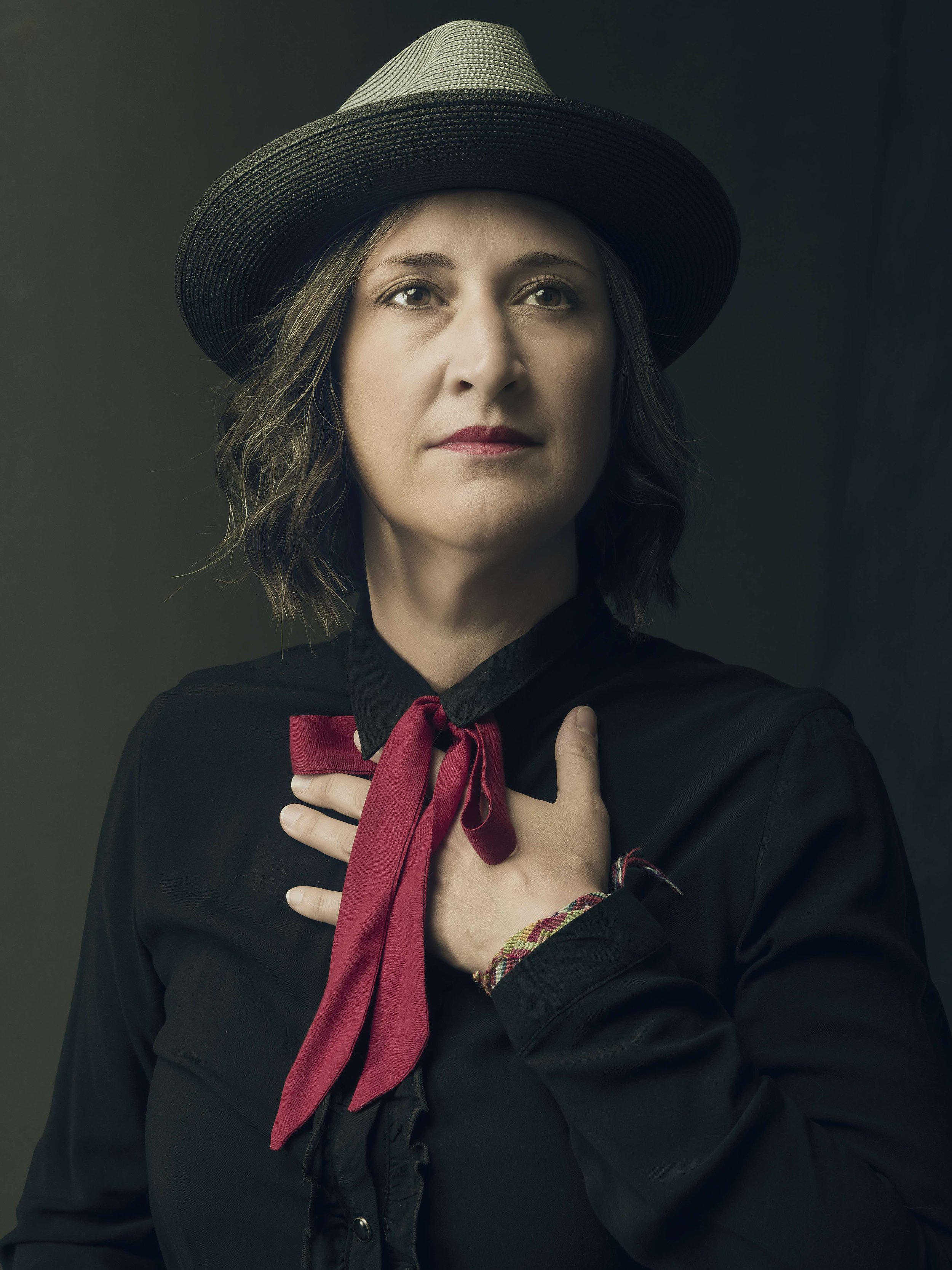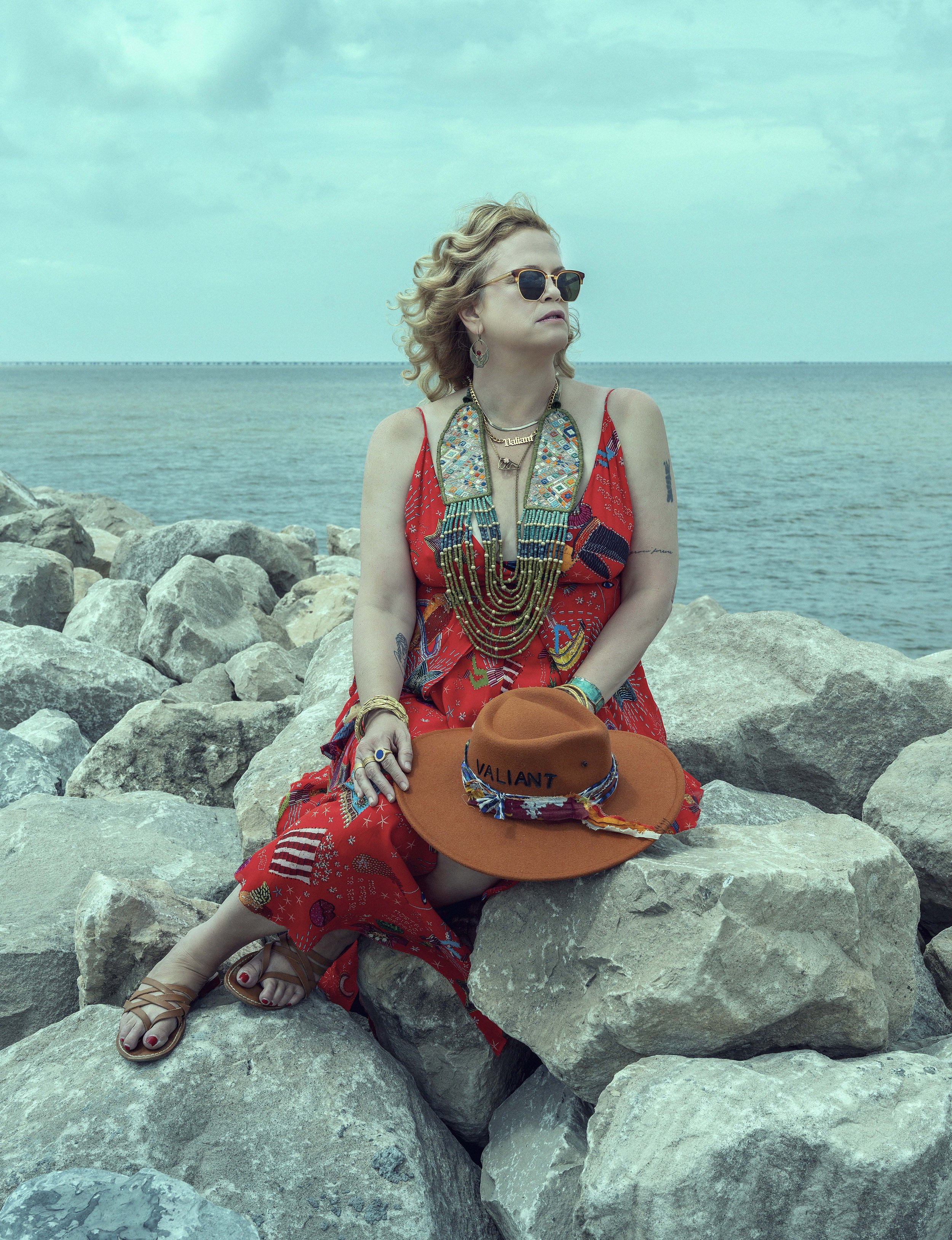Judith Owen Sings About What's Really Important at Jazz Fest

The Welsh singer will be joined by the Krewe de Jude when she plays the festival Saturday.
When Judith Owen presides over the annual Christmas sing-along show that she does each year with husband Harry Shearer, she's a big presence. She can be as tender as the moment requires, but she can also ride herd on the audience if necessary, charming or cajoling a situation into submission as the show requires. Nobody brings more lion tamer to the holiday season than Owen.
Her performances of her own music out of the season are more nuanced. She comes from the singer/songwriter tradition, and she capitalizes on its history of musicians speaking personally. As her most recent album, Somebody's Child, illustrates, Owen holds up her end of the bargain by making sure the songs deal with genuine, complex emotions in musical structures sturdy enough to carry them.
Owen will play Jazz Fest's Lagniappe Stage Saturday at 5:15 p.m. with the Krewe de Jude--bassist Leland Sklar, percussionist Pedro Segundo, and a string section that includes Helen Gillet on cello, Harry Hardin on violin, and Rebecca Crenshaw on viola.
Recently, I interviewed Owen via email:
What does an album represent to you? In some cases, albums are very clearly distinct statements, but yours feel very much of a piece with more in common than not from album to album. I wonder if that’s shaped by what you conceptualize an album to be?
My albums have always been confessional. I’ve written about the struggles we all go through with empathy and humor. What makes Somebody’s Child differ it that it’s not about the internal, it’s about the external--me looking out at life, seeing the bigger picture and realizing what’s really important in this self-absorbed world!. Everything stemmed from the title track, a song about a homeless girl I saw on the streets of NYC barefoot in the snow, crazy on drugs, hugely pregnant and wearing only trash bags for clothes. Of course I ran in the opposite direction (who wants to look human fragility in the face?). Thankfully, I came to my senses and had this very clear thought, “That’s somebody’s child,” like me, like all of us.
I knew then that if I’d been dealt different cards in life, that could be me on the street. It was a reminder not to miss the really important stuff, whilst rushing through my self-absorbed life, and the whole album is about that. From humorous songs about me being addicted to my cell phone whilst life passes me by, to the ones about the planet and our state of denial. It’s serious but has a healthy dose of self-deprecation. I mean, how else would you get through life?
How do you see Somebody’s Child as different from Ebb & Flow and Some Kind of Comfort?
Well Some Kind of Comfort was a companion album to a two-woman show I co-created and starred in on London’s West End, so it was a much more stripped-down record, focusing more on the show’s subject matter--battling with and coming through depression.
Ebb & Flow was really my love letter to the '70s troubadours of Laurel Canyon, who I grew up listening to and who were a huge influenced my confessional style. It’s what lead me to work with legends Leland Sklar, (who joins me at Jazz Fest), Russ Kunkel and Waddy Wachtel, all of whom started with giants like James Taylor, Carole King, Joni Mitchell and Linda Ronstadt, to name but a few.
It was very old school, just like those '70s records, live in the round, one or two takes. I get bored with myself after three!
The chemistry between us was palpable, and they’ve become a rich part of my life as musicians and friends. They’re all on Somebody's Child, and between them and my UK string players and percussionist, my two worlds--Britain and the US--are brought together. So I guess you say that Some Kind of Comfort was very British, Ebb & Flow was very American, and Somebody's Child is a marriage of both!
On the album, you covered Roxy Music’s “More Than This” Why, and have you been able to play it while on tour with Bryan Ferry?
Not when I'm opening for Bryan, which I’m in currently the midst of, but when I do headline shows in between, absolutely!. I love re-interpreting great songs and turning them on their heads.I started with a bossa nova version of “Smoke on the Water” and have been doing it ever since. When i was opening for Bryan in 2015, I was hearing him sing it every night and at the time was feeling fulfilled and incredibly homesick, so his song really changed from being a romantic song into one of realization that without the ones you love to share in life, nothing means as much. The icing on the cake was recording it in his studio when we had a couple of days off. Magical.
When you were a teenager, who was the musician you wanted to be? Related to that, who were the British artists — particularly the British female artists - who inspired you? Why?
I was brought up in a truly musical Welsh household with an Opera singer father, so there was classical music constantly in my life. At the same time, both my parents were big jazz, blues and R&B fans, so all of those along with really melancholy Welsh folk music, were my primary influences (which you can still hear in my songs). Then I started listening to even more US artists, the most important being Stevie Wonder, Aretha Franklin, Joni Mitchell and of the Brits--Kate Bush, Annie Lennox, and Dusty Springfield. A young Elton John was hugely influential. I never thought any of this music was diametrically opposed, but saw it as the language I spoke when writing and singing. So my style is really about melding all these styles.
You as much as anybody I know embrace music as a social act. Do you remember when that idea solidified for you? Because I’d imagine that when you start to perform for an audience, the first instinct is to think of your performance in terms of you.
I started as a solo artist and and still when it comes to the writing. I’ll always love playing solo, but nothing comes close to sharing the stage with great musicians and feeling the joy move between you. Unlike many other art forms, music really is a collaborative medium that’s best shared. It’s bloody lonely being a soloist, and I’ve always yearned for companionship on the road and on the stage! So as soon as I began performing with people whose playing and company I loved, I never wanted to work alone again. I know many other soloists who feel the same way and as someone who manages depression and anxiety, every day. feeling supported and not isolated is gift.
The irony of music being social is that yours tends to be intimate and feel very personal. How in your mind do you fit together the social way music is inspired and performed with the personal, singular vision behind it?
Well I believe that music is here to entertain and touch. My job is to give the listener or audience permission to feel--to make them laugh and cry, but not to have them leave the venue depressed.
My present band is like a mini-orchestra with the emphasis on strings in addition to Leland on bass and Pedro on percussion. All of us are classical babies and because of that, we all understand the need for emotional music like mine to breath, have highs and lows, space with the voice out front telling the tale, connecting with the listener. Everyone dances around the songs and within every set, I make sure there are delicate duets, and solos amongst the more muscular songs. It’s an emotionally dynamic ride that audience joins me on, it’s not all on one note. I mean without the valleys you can't see the mountains!
var myNativeAd = { consumerKey: "hbfXS0hRQY4yB2IIyHFh29",use_external_settings: true }






